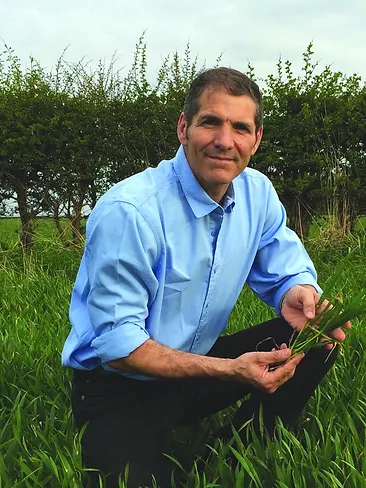
Former NFU Vice-President Paul Temple has welcomed the recent passing into law of the Genetic Technology (Precision Breeding) Act as a major opportunity to capitalise on the UK’s world-leading scientific strengths in plant genetics, and to accelerate the development of higher-yielding crop varieties requiring fewer chemical inputs, with improved nutritional quality and resilience to greater climate extremes.
But pointing to recent claims by anti-biotech group GM Freeze that co-existence is not already part of current UK farming arrangements, he also called for the public debate around gene editing in agriculture to be rooted in facts and evidence, not scaremongering and hearsay.
In a recent article focusing on gene editing co-existence discussions in Europe, Liz O’Neill of GM Freeze told a Canadian newspaper that because GMO crops are not grown commercially on UK farms, ‘contamination prevention’ isn’t part of farmers’ business models.
Mr Temple countered that, on the contrary, protocols enabling farmers to produce crops destined for different markets are routine within UK agriculture.
“Without co-existence arrangements, growers would not be able to produce high-purity certified seed, or segregate food grade and (toxic) industrial oilseed rape, or keep feed varieties of wheat separate from those intended for breadmaking.”
“Separate storage of seed and harvested crops, good machinery hygiene, careful planning and sequencing of rotations, communication with neighbouring growers, and accurate record-keeping are all part of normal commercial arable operations. These routine procedures help ensure farmers can meet the quality needs and specifications of end-users. The same arrangements are equally capable of supporting co-existence between organic and conventional farms in relation to gene edited crops,” he said.
As organic and NGO campaigners step up their opposition to the use of gene editing in English agriculture following the passing into law of the Genetic Technology Act, Mr Temple called for the debate around issues such as traceability and co-existence of supply chains to be based on the practical realities of commercial crop production, not on ignorant or misleading claims from campaigning NGOs.
Mr Temple added that, as part of the debate, recognition of the practical realities must extend to the routine use of non-organic inputs permitted under organic standards.
“Derogations to use non-organic seed, feed, forage, breeding stock, antibiotics and anthelmintics are all routine within organic farming systems. Organic production would not be sustainable without such exemptions,” he said, highlighting a September 2021 article in the Veterinary Record which noted that ‘the use of anthelmintic and antibiotic medicines is imperative to prevent the suffering of diseased stock in organic farming.’
He also pointed to a recent article on the Science for Sustainable Agriculture website which showed that, despite a long-term decline in the UK organic area, ‘emergency’ derogations to use non-organic seed – produced using the same synthetic pesticides and fertilisers banned under organic rules – reached a record high in 2022, with more than 17,000 separate authorisations.
“When most shoppers paying a hefty premium for organic produce would probably not expect any of these non-organic inputs to be used in organic farming, it seems rather disingenuous for the organic lobby to be demanding extra safeguards in relation to gene edited crops, which are indistinguishable from their conventionally bred counterparts,” he added.
ENDS
Notes
Paul Temple manages a mixed arable and livestock farm on the East Yorkshire Wolds, producing cereals for seed, oilseed rape, vegetables and beef. Paul is a past vice-president of the National Farmers Union, former chairman of the Copa Cogeca Cereals, Oilseeds and Protein Group, and founder of the European Biotech Forum. He previously sat on the National Non-Food Crops Board, and has chaired the AHDB’s cereals and oilseeds sector and the Voluntary Initiative — an industry-led programme which promotes responsible use of pesticides. He is also a board member of the Global Farmer Network, which brings together farming leaders from around the world to amplify the farmers’ voice in promoting trade, technology, sustainable farming, economic growth, and food security.





